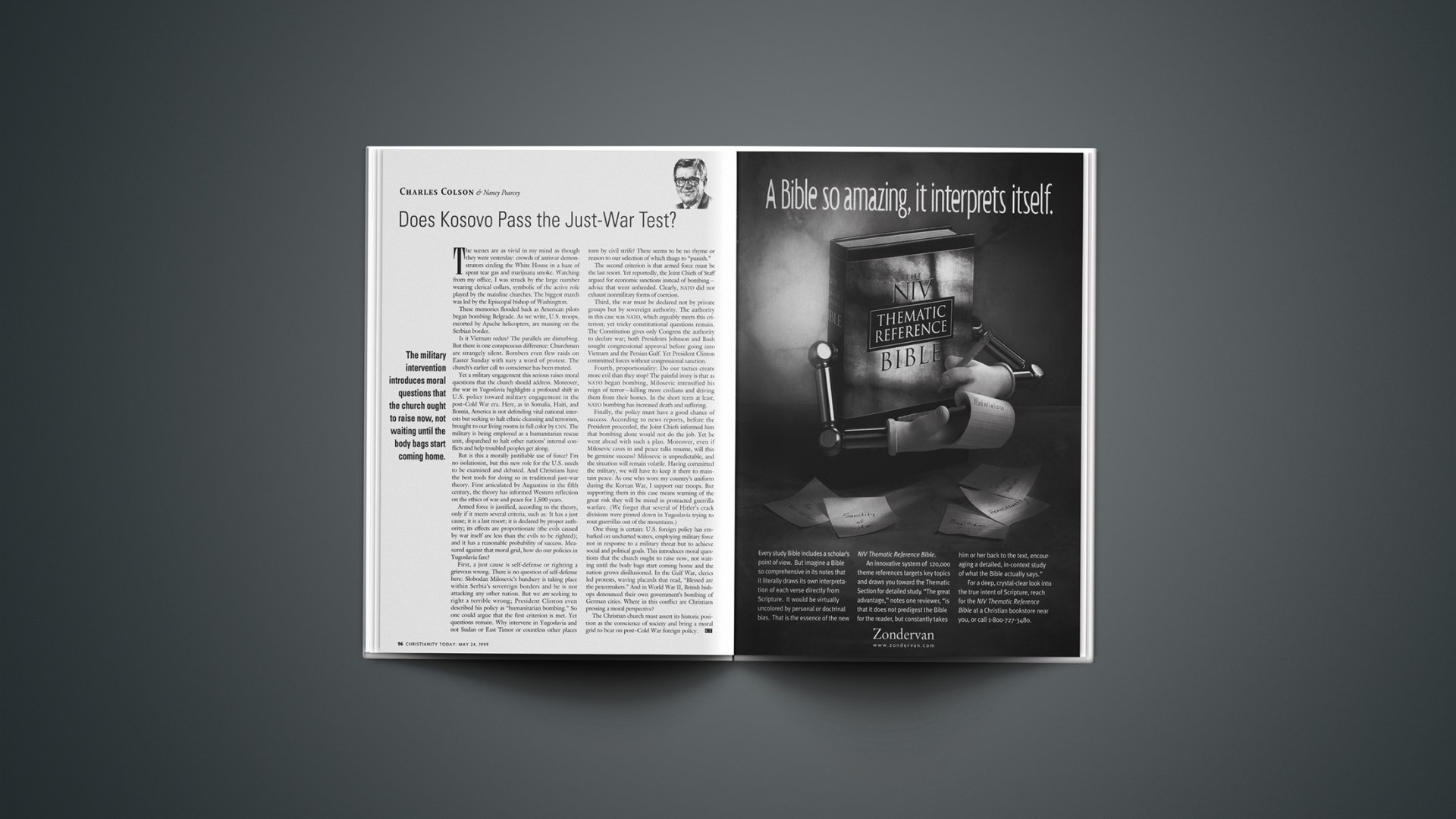The scenes are as vivid in my mind as though they were yesterday: crowds of antiwar demonstrators circling the White House in a haze of spent tear gas and marijuana smoke. Watching from my office, I was struck by the large number wearing clerical collars, symbolic of the active role played by the mainline churches. The biggest march was led by the Episcopal bishop of Washington.
These memories flooded back as American pilots began bombing Belgrade. As we write, U.S. troops, escorted by Apache helicopters, are massing on the Serbian border.
Is it Vietnam redux? The parallels are disturbing. But there is one conspicuous difference: Churchmen are strangely silent. Bombers even flew raids on Easter Sunday with nary a word of protest. The church’s earlier call to conscience has been muted.
Yet a military engagement this serious raises moral questions that the church should address. Moreover, the war in Yugoslavia highlights a profound shift in U.S. policy toward military engagement in the postCold War era. Here, as in Somalia, Haiti, and Bosnia, America is not defending vital national interests but seeking to halt ethnic cleansing and terrorism, brought to our living rooms in full color by CNN. The military is being employed as a humanitarian rescue unit, dispatched to halt other nations’ internal conflicts and help troubled peoples get along.
But is this a morally justifiable use of force? I’m no isolationist, but this new role for the U.S. needs to be examined and debated. And Christians have the best tools for doing so in traditional just-war theory. First articulated by Augustine in the fifth century, the theory has informed Western reflection on the ethics of war and peace for 1,500 years.
Armed force is justified, according to the theory, only if it meets several criteria, such as: It has a just cause; it is a last resort; it is declared by proper authority; its effects are proportionate (the evils caused by war itself are less than the evils to be righted); and it has a reasonable probability of success. Measured against that moral grid, how do our policies in Yugoslavia fare?
First, a just cause is self-defense or righting a grievous wrong. There is no question of self-defense here: Slobodan Milosevic’s butchery is taking place within Serbia’s sovereign borders and he is not attacking any other nation. But we are seeking to right a terrible wrong; President Clinton even described his policy as “humanitarian bombing.” So one could argue that the first criterion is met. Yet questions remain. Why intervene in Yugoslavia and not Sudan or East Timor or countless other places torn by civil strife? There seems to be no rhyme or reason to our selection of which thugs to “punish.”
The second criterion is that armed force must be the last resort. Yet reportedly, the Joint Chiefs of Staff argued for economic sanctions instead of bombing—advice that went unheeded. Clearly, NATO did not exhaust nonmilitary forms of coercion.
Third, the war must be declared not by private groups but by sovereign authority. The authority in this case was NATO, which arguably meets this criterion; yet tricky constitutional questions remain. The Constitution gives only Congress the authority to declare war; both Presidents Johnson and Bush sought congressional approval before going into Vietnam and the Persian Gulf. Yet President Clinton committed forces without congressional sanction.
Fourth, proportionality: Do our tactics create more evil than they stop? The painful irony is that as NATO began bombing, Milosevic intensified his reign of terror—killing more civilians and driving them from their homes. In the short term at least, NATO bombing has increased death and suffering.
Finally, the policy must have a good chance of success. According to news reports, before the President proceeded, the Joint Chiefs informed him that bombing alone would not do the job. Yet he went ahead with such a plan. Moreover, even if Milosevic caves in and peace talks resume, will this be genuine success? Milosevic is unpredictable, and the situation will remain volatile. Having committed the military, we will have to keep it there to maintain peace. As one who wore my country’s uniform during the Korean War, I support our troops. But supporting them in this case means warning of the great risk they will be mired in protracted guerrilla warfare. (We forget that several of Hitler’s crack divisions were pinned down in Yugoslavia trying to rout guerrillas out of the mountains.)
One thing is certain: U.S. foreign policy has em barked on uncharted waters, employing military force not in response to a military threat but to achieve social and political goals. This introduces moral questions that the church ought to raise now, not waiting until the body bags start coming home and the nation grows disillusioned. In the Gulf War, clerics led protests, waving placards that read, “Blessed are the peacemakers.” And in World War II, British bishops denounced their own government’s bombing of German cities. Where in this conflict are Christians pressing a moral perspective?
The Christian church must assert its historic position as the conscience of society and bring a moral grid to bear on postCold War foreign policy.
Copyright © 1999 Christianity Today. Click for reprint information.










